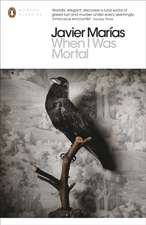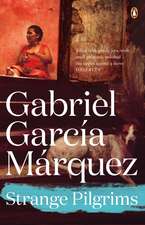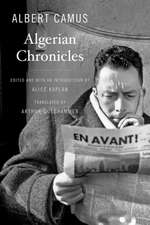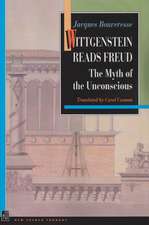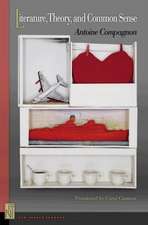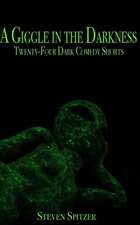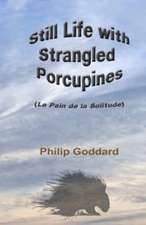Exile and the Kingdom
Autor Albert Camusen Limba Engleză Paperback – 31 ian 2007
Now, on the 50th anniversary of the book’s publication, Carol Cosman’s new translation recovers a literary treasure for our time.
Albert Camus won the Nobel Prize for Literature in 1957.
| Toate formatele și edițiile | Preț | Express |
|---|---|---|
| Paperback (2) | 62.15 lei 3-5 săpt. | +4.10 lei 5-11 zile |
| Penguin Books – 5 iul 2006 | 62.15 lei 3-5 săpt. | +4.10 lei 5-11 zile |
| Vintage Publishing – 31 ian 2007 | 88.86 lei 3-5 săpt. |
Preț: 88.86 lei
Nou
Puncte Express: 133
Preț estimativ în valută:
17.01€ • 17.69$ • 14.04£
17.01€ • 17.69$ • 14.04£
Carte disponibilă
Livrare economică 24 martie-07 aprilie
Preluare comenzi: 021 569.72.76
Specificații
ISBN-13: 9780307278586
ISBN-10: 0307278581
Pagini: 192
Dimensiuni: 132 x 203 x 15 mm
Greutate: 0.18 kg
Ediția:Vintage Intl.
Editura: Vintage Publishing
ISBN-10: 0307278581
Pagini: 192
Dimensiuni: 132 x 203 x 15 mm
Greutate: 0.18 kg
Ediția:Vintage Intl.
Editura: Vintage Publishing
Notă biografică
Albert Camus was born in Algeria in 1913. He spent the early years of his life in North Africa, where he worked at various jobs—in a weather bureau, in an automobile supply firm, in a shipping company—to help pay for his courses at the University of Algiers. He went on to become a journalist, and from 1935 to 1938 he ran the Theatre de l'Equipe, a theatrical company that produced plays by Malraux, Gide, Synge, Dostoyevsky, and others. During World War II he was one of the leading writers of the French Resistance and editor of Combat, then an important underground newspaper. His fiction, including The Stranger, The Plague, The Fall, and Exile and the Kingdom; his philosophical essays, "The Myth of Sisyphus" and "The Rebel"; and his plays have assured his preeminent position in modern letters. In 1957 Camus was awarded the Nobel Prize for Literature. On January 4, 1960, he was killed in a car accident. Carol Cosman has translated works by Balzac and Simone de Beauvoir from the French as well as JeanPaul Sartre's biography of Flaubert.
Extras
The Adulterous WifeA fly circled feebly for a moment toward the raised windows of the bus. Oddly, it came and went in silence, in exhausted flight. Janine lost sight of it, then saw it land on her husband's motionless hand. It was cold. The fly trembled at every gust of sandy wind that scratched against the windows. In the meager light of the winter morning, with a great screech of sheet metal and shock absorbers, the vehicle rolled and pitched, scarcely advancing. Janine looked at her husband. With tufts of graying hair sprouting on a low brow, a large nose, an uneven mouth, Marcel looked like a sulky faun. At every bump in the road, she felt him bounce against her. Then he let his torso sink heavily on his spread legs, his eyes glazed, once again inert, absent. Only his thick, hairless hands seemed to move, looking even shorter in the gray flannel that hung below his shirtsleeves and covered his wrists. They squeezed a little canvas case, set between his knees, so tightly that they appeared not to feel the hesitant course of the fly.Suddenly they heard distinctly the screaming of the wind, and the mineral fog that surrounded the bus became even thicker. The sand now hurled itself at the windows in fistfuls, as if thrown by invisible hands. The fly waved a frail wing, flexed its legs, and flew off. The bus slowed down and seemed about to stop. Then the wind appeared to grow calmer, the fog cleared a little, and the vehicle sped up again. Holes of light were opening in the landscape drowned in dust. Two or three palm trees, delicate and whitened, as though cut from metal, surged at the window only to disappear an instant later."What a country!" Marcel said.The bus was full of Arabs who seemed to be asleep, buried in their burnooses. Some had put their feet up on the benches and swayed more than others with the movement of the vehicle. Their silence, their impassiveness, weighed on Janine; she felt she had been traveling for days with this mute escort. Yet the bus had left at dawn from the railway station, and for two hours in the cold morning it had been advancing over a rocky, desolate plateau that, at least at the outset, had extended its lines straight to the reddening horizon. But the wind had risen, and little by little it had swallowed the vast expanse. From that moment, the passengers could see nothing; one by one they had fallen quiet and had navigated in silence in a kind of sleepless night, sometimes rubbing their lips and eyes, irritated by the sand that had filtered into the car."Janine!" She jumped at her husband's summons. She thought once more what a ridiculous name she had, tall and strong as she was. Marcel wanted to know where to find the sample case. She felt around the empty space under the bench with her foot and encountered an object she thought must have been the case. She could not bend down without coughing a little. In high school, though, she was first in gymnastics, never out of breath. Was it so long ago? Twenty-five years. Twenty-five years were nothing; it seemed to her only yesterday that she was hesitating between a free life and marriage, only yesterday that she had felt such anguish at the thought that perhaps one day she would grow old alone. She was not alone, and that law student who never wanted to leave her was now at her side. She had accepted him in the end, although he was a little short and she did not much like his hungry, sudden laugh, or his dark protruding eyes. But she loved his courage to live, which he shared with the French of this country. She also loved his downcast air when events or men belied his expectations. Above all, she loved being loved, and he had flooded her with attentions. Making her feel so often that she existed for him, he made her existence real. No, she was not alone . . .The bus, with great warning honks, found its way through invisible obstacles. Inside, however, no one moved. Janine suddenly felt that someone was looking at her and turned toward the bench that was the extension of hers, across the aisle. He was not an Arab, and she was surprised not to have noticed him at their departure. He wore the uniform of the French legion of the Sahara and a kepi of grayish brown cloth on his tanned face, which was long and pointed like a jackal's. He examined her with his clear eyes, staring silently. She blushed all of a sudden and turned back toward her husband, who continued to gaze before him, into the fog and wind. She wrapped herself up snugly in her coat. But she could still see the French soldier, tall and thin, so thin in his close-fitting tunic that he seemed made of some dry and crumbling matter, a mixture of sand and bone. It was at this moment that she saw the thin hands and sunburned faces of the Arabs in front of her, and she noticed that despite their ample clothing, they seemed to have plenty of room on the benches where she and her husband were barely perched. She pulled the lapels of her coat closer. Yet, she was not so heavy but tall and full, fleshy and still desirable--she certainly felt it in men's gazes--with her rather childish face, her bright, clear eyes in contrast to this big body that was, she knew, warm and welcoming.No, nothing was the way she had imagined. When Marcel had wanted to take her along on his trip, she had protested. He had pondered this journey for a long time--since the end of the war, to be precise, around the time when commerce had returned to normal. Before the war, the small fabric business he had taken over from his parents, when he had given up his legal studies, had made them a decent living. On the coast, the early years could be happy. But he had not much liked physical effort, and very quickly he had stopped taking her to the beach. The little car took them out of town only for their Sunday drive. The rest of the time, he preferred his shop of multicolored fabrics in the shade of the arcades of this half-native, half-European quarter. They lived above the boutique in three rooms decorated with Arab hangings and middle-class furniture. They had not had children. The years had passed in the shadows they had maintained behind the half-closed shutters. Summer, the beaches, the drives, even the sky were long ago. Nothing but his business seemed to interest Marcel. She believed she had discovered his true passion, which was money, and she did not like this, without exactly knowing why. After all, it was to her advantage. He was not miserly; on the contrary, he was generous, especially with her. "If anything happens to me," he would say, "you'll be protected." And indeed one must be protected from need. But more than that, aside from the simplest needs, where would she find protection? That was what she felt from time to time in a confused way. Meanwhile, she helped Marcel keep his books and occasionally took a turn at the shop. The hardest time was summer, when the heat killed even the sweet sensation of boredom.Suddenly in midsummer, the war, Marcel mobilized then rejected by the army, the scarcity of fabrics, business at a halt, the streets hot and deserted. If something happened, henceforth she would no longer be protected. That was why, since the return of fabrics to the market, Marcel had imagined traveling to the villages of the high plateaus and the south to bypass the middlemen and sell directly to the Arab merchants. He had wanted to take her with him. She knew that travel was difficult, she had trouble breathing, she would have preferred to wait for him. But he was obstinate and she had accepted because it would have taken too much energy to refuse. Here they were now, and really, nothing was the way she had imagined. She had feared the heat, the swarms of flies, the filthy hotels reeking of anise. She had not thought of the cold, of the cutting wind, of the nearly polar plateaus cluttered with moraines. She had also dreamed of palm trees and soft sand. She saw now that the desert was not that at all but only stone, stone everywhere, in the sky where, crunching and cold, the stone dust alone still reigned, as on the earth where alone, between the stones, the dry grass grew.The bus stopped abruptly. The driver fired off a few words in that tongue she had heard all her life without understanding. "What's this?" asked Marcel. The driver, this time in French, said that sand must have clogged up the carburetor, and Marcel cursed the country again. The driver laughed heartily and assured them that it was nothing, that he was going to clean out the carburetor and then they would be on their way. He opened the doors, the cold wind rushed into the car, instantly pelting their faces with a thousand grains of sand. All the Arabs plunged their noses into their burnooses and hunched in on themselves. "Close the door!" Marcel shouted. The driver laughed, coming back toward the doors. Deliberately, he took some tools from under the dashboard, then, tiny in the fog, disappeared again toward the front of the bus without closing the door. Marcel sighed. "You can be sure he's never seen an engine in his life." "Leave it be!" Janine said. Suddenly, she started. On the embankment, just next to the bus, stood motionless covered shapes. Beneath the hoods of the burnooses, and behind a rampart of veils, only their eyes could be seen. Mute, appearing out of nowhere, they gazed at the travelers. "Shepherds," Marcel said.Inside the bus, there was utter silence. All the passengers, heads lowered, seemed to be listening to the voice of the wind, unleashed across these endless plateaus. Janine was suddenly struck by the nearly total absence of luggage. At the railway station, the driver had hoisted their trunk and a few bundles onto the roof. Inside, in the overhead nets, only gnarled sticks and flat baskets could be seen. All these people from the south evidently traveled empty-handed.But the driver was coming back, ever alert. Only his eyes were laughing above the veil with which he, too, had masked his face. He announced that they were on their way. He closed the doors, the sound of the wind was silenced, and now they could hear the rain of sand on the windows. The engine coughed, then died. With persistent pleading from the ignition, it finally turned over and the driver made it shriek as he pressed on the accelerator. With a great sputtering, the bus resumed its journey. From the ragged mass of shepherds, motionless as ever, a hand was raised, then vanished in the fog behind them. Almost immediately, the vehicle began to bounce on the deteriorating road. Shaken, the Arabs swayed ceaselessly back and forth. Yet Janine felt sleep overtaking her when a little yellow box, filled with licorice drops, materialized before her. The soldier-jackal was smiling at her. She hesitated, helped herself, and thanked him. The jackal pocketed the box and instantly swallowed his smile. Now he was staring straight ahead at the road. Janine turned toward Marcel and saw only the solid back of his neck. He was looking through the windows at the dense fog rising up the crumbling embankment.They had been on the road for hours, and fatigue had extinguished all life inside the bus when cries resounded from outside. Children in burnooses, twirling like tops, jumping, clapping their hands, were running around the vehicle. The bus was driving down a long street flanked by low houses: they were entering an oasis. The wind continued to blow, but the walls stopped the particles of sand, which no longer obscured the light. The sky, however, remained overcast. Amid the cries, with a great screech of brakes, the bus stopped in front of the adobe arcades of a hotel with dirt-streaked windows. Janine got off and, once in the street, felt unsteady. She glimpsed a graceful yellow minaret above the houses. To her left, the first palm trees of the oasis stood out, and she would have liked to go toward them. But although it was close to noon, the cold was sharp; the wind made her shiver. She turned toward Marcel, and saw the soldier coming to meet her. She expected a smile or greeting. He passed without looking at her and disappeared. As for Marcel, he was busy extricating his trunk of fabrics, a black footlocker perched on the roof of the bus. The driver was the only one occupied with the baggage, and he had already stopped, standing on the roof, holding forth to the circle of burnooses gathered around the bus. Janine, surrounded by faces that seemed carved from leather and bone, besieged by guttural cries, suddenly felt her exhaustion. "I'm going to the hotel," she said to Marcel, who was impatiently shouting at the driver.She entered the hotel. The manager, a thin and taciturn Frenchman, went before her. He led her up to the first floor, along a gallery facing the street, into a room furnished with only an iron bedstead, a chair painted with white varnish, a wardrobe with no curtains, and behind a rush screen a toilet and sink covered with a fine dusting of sand. When the manager had closed the door, Janine felt the cold coming from the bare whitewashed walls. She did not know where to put down her bag or herself. She had to lie down or remain standing, and in either case to keep shivering. She remained standing, her bag in her hand, staring at a kind of narrow window near the ceiling open onto the sky. She waited but without knowing why. She felt only her solitude and the penetrating cold, and a heavy weight around her heart. She was dreaming, really, almost deaf to the sounds rising from the street punctuated by bursts of Marcel's voice, more aware of the murmur of a river coming from the window, a murmur raised by the wind in the palm trees, so close now, it seemed to her. Then the wind doubled in force, the gentle voice of the waters becoming the whistling of waves. She imagined behind the walls a sea of palm trees, straight and supple, tossing in the storm. Nothing was the way she had imagined, but those invisible waves refreshed her tired eyes. She stood there, heavily, her arms hanging, a little bent, the cold climbing up her heavy legs. She was dreaming of the palm trees, straight and supple, and of the young girl she had been.
Recenzii
“Thoroughly engrossing” —The New York Times“[These stories] invite comparison with his best work” —The Nation
Cuprins
Foreword
Introduction
The Adulterous Wife
The Renegade, or A Confused Mind
The Voiceless
The Guest
Jonas, of The Artist at Work
The Growing Stone
Introduction
The Adulterous Wife
The Renegade, or A Confused Mind
The Voiceless
The Guest
Jonas, of The Artist at Work
The Growing Stone
Descriere
These six stories, written at the height of Camus' artistic powers, all depict people at decisive, revelatory moments in their lives. Translated by Justin O'Brien.



